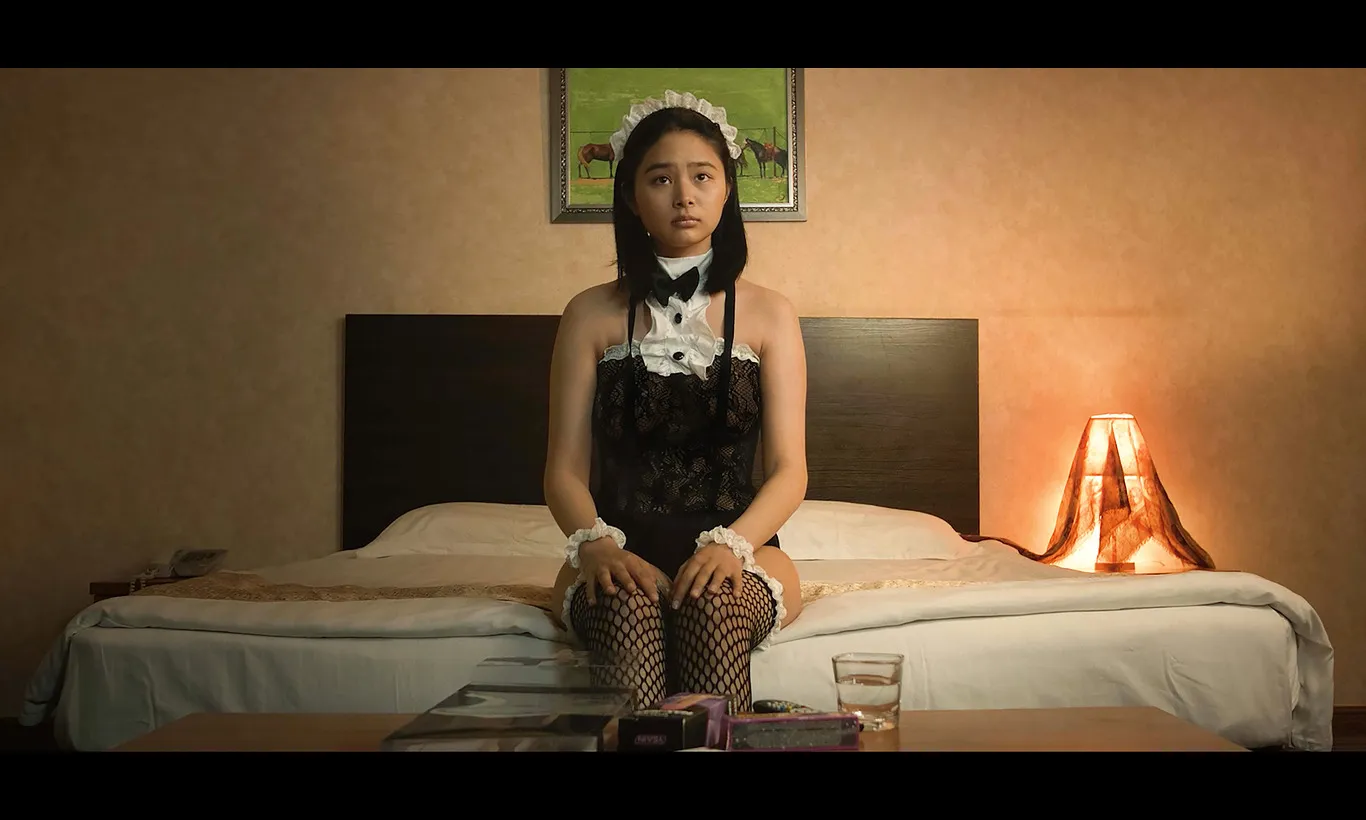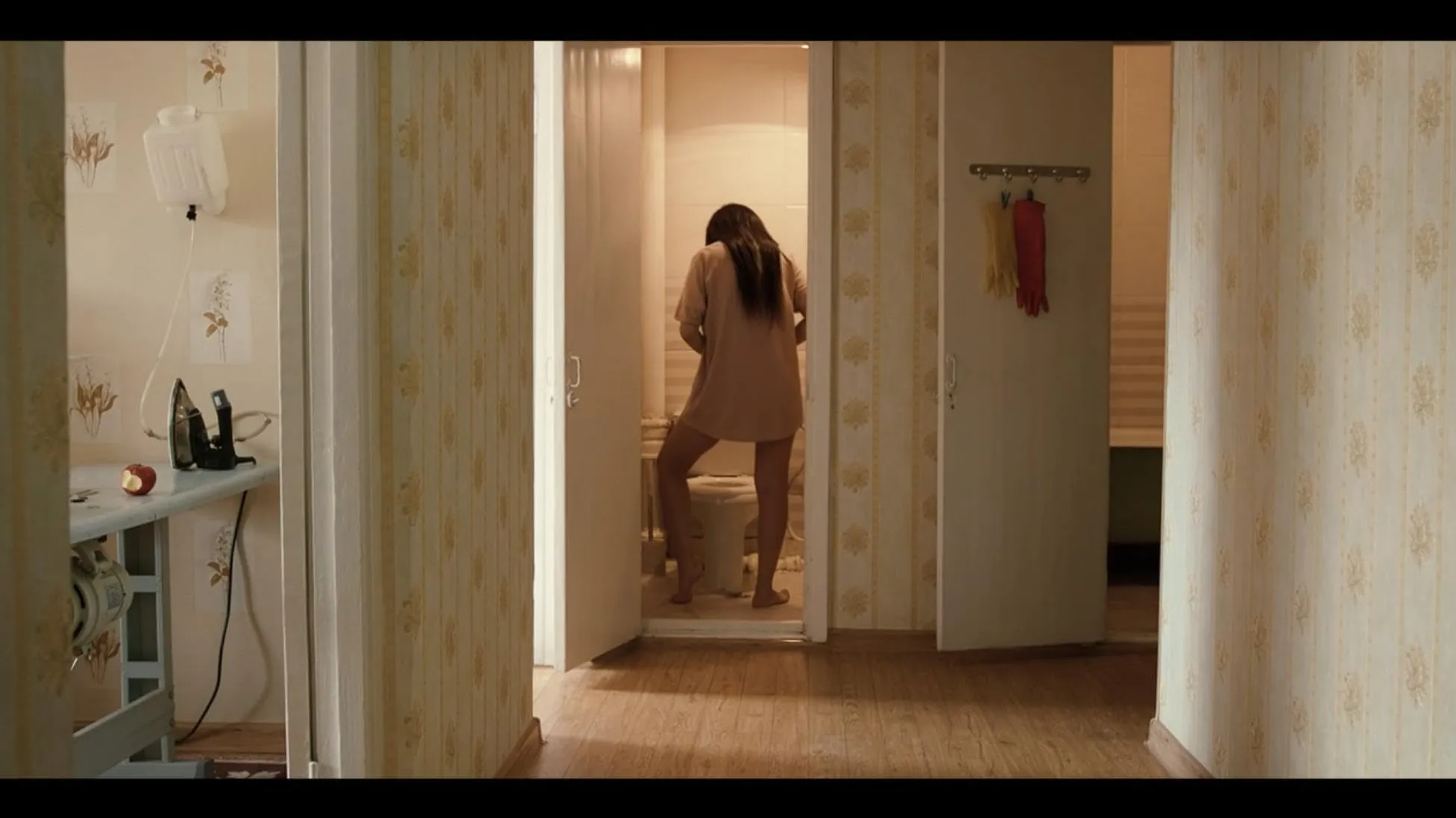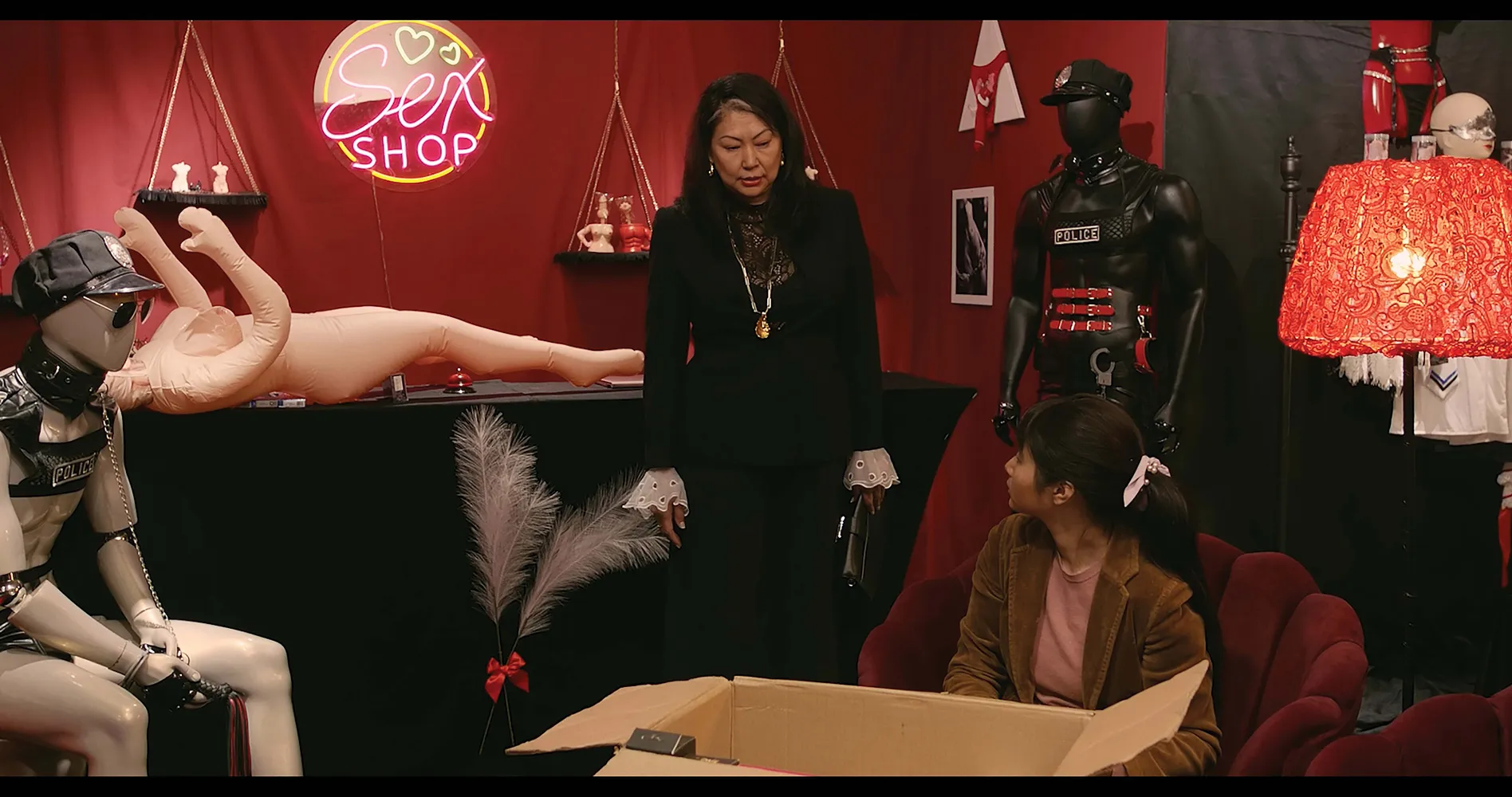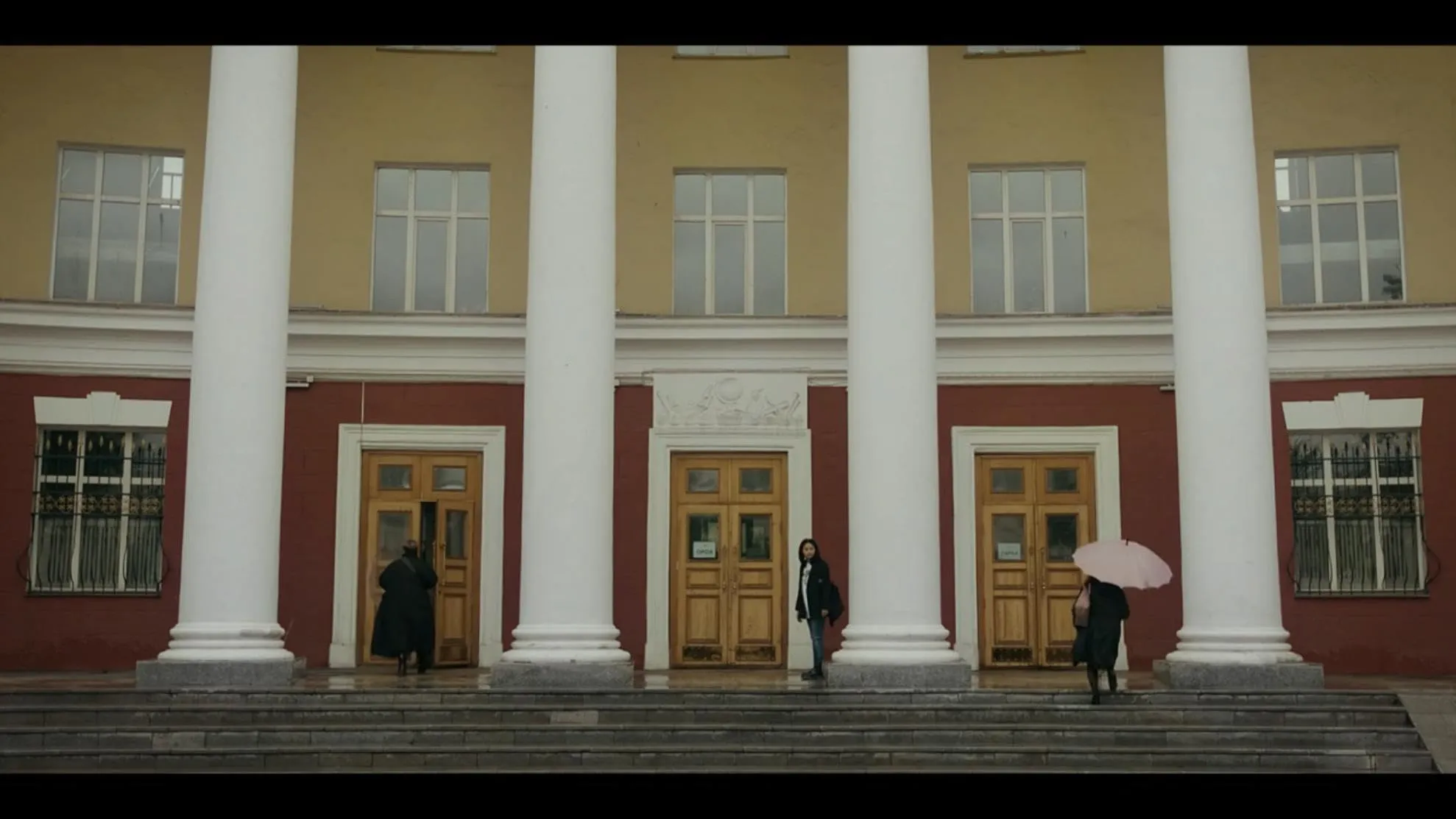In the capital city of Ulaanbaatar, a shy art student named Saruul finds her life moving in a surprising new direction. Veteran director Janchivdorj Sengedorj skillfully guides us through Saruul’s journey of self-discovery in his latest film, The Sales Girl.
Sengedorj has established himself as one of Mongolia’s most talented storytellers. In The Sales Girl, he once again focuses on the experiences of youth, capturing the exploration and uncertainties of coming of age. Saruul is played beautifully by newcomer Bayarjargal Bayartsetseg, who brings a quiet depth to her role. When a classmate breaks her leg, Saruul agrees to fill in at a temporary job, little realizing how much it would influence her. She now works at a sex shop, introducing her to a fascinating new world.
Through Saruul’s time at the shop, we meet Katya, a mysterious older woman who owns the business. Portrayed by veteran actress Enkhtuul Oidovjamts, Katya serves as a guiding light for Saruul, mentoring her through this journey of self-exploration. Their developing friendship forms the heart of this indie film. While set within the underground community of a sex shop, Sengedorj imbues the story with earnestness, prioritizing Saruul’s personal growth above lurid themes.
The Sales Girl presents a nuanced perspective often unseen in global cinema. It shines a light on hidden corners of Mongolian culture and everyday life, portraying society’s effects on a young woman coming into her own. Sengedorj’s latest film is a subtle, resonant work worthy of wider appreciation.
Journey into the Unknown
Our story follows Saruul, a quiet university student in Ulaanbaatar, Mongolia. While talented at art, her conservative parents push her to study engineering. When a classmate breaks her leg, Saruul unexpectedly finds herself temporarily working at a local sex shop.
There, amidst an array of intimate toys, she meets the intriguing Katya. As the Russian owner of the shop, Katya lives boldly outside social norms. Where Saruul feels constrained, Katya embraces life’s pleasures freely. The two women could not be more different.
As the month passes, Saruul gains experience in her novel role. To her surprise, she develops a close bond with Katya. The older woman shares thoughts openly and mentors Saruul with compassion. Through their time together, Saruul’s perspectives gradually change. She begins to challenge assumptions about her conservative upbringing.
Saruul also delivers products around the city, experiencing new people and places. However, one client takes advantage of her naivety, which shakes her deeply. With Katya’s support, Saruul finds the strength to keep going.
Away from work, Saruul continues pondering life’s mysteries. She draws and experiments quietly, sorting her feelings. Small moments, like riding the bus absorbed in music, offer private reflection. As Saruul’s inner world expands, she develops a sweet romance too.
By the story’s end, Saruul has embraced unknown parts of herself. While her path ahead stays unclear, she approaches it empowered. This unlikely job opening a door to discoveries, Saruul bids Katya farewell transformed—more assured in who she is and what she wants from life. Her journey into uncharted territory brings self-realization in the most profound of ways.
Journeying through Completion
Director Janchivdorj Sengedorj exhibits deft control in overseeing The Sales Girl’s meaningful narrative. While the humble sex shop sets an unusual stage, Sengedorj navigates more profound themes with nuance. He handles potentially sensitive topics respectfully, prioritizing his characters’ interior journeys. Never does the film feel exploitative or lose sight of its heart.
Central to Sengedorj’s success are the spellbinding performances at the story’s heart. In her debut role, Bayartsetseg Bayangerel brings Saruul to life with empathy and soul. One feels Saruul’s quiet contemplation of the world around her and within. Bayangerel ensures even her subtlest expressions and moments of stillness resonate. Her evolution feels authentic, and one cannot help but root for Saruul as she comes to know herself on her own terms.
Equally captivating is theater veteran Enkhtuul Oidovjamts as the vibrant Katya. Where Saruul remains inward, Katya embraces all that life offers—yet complexity lurks beneath her bold exterior. Oidovjamts imbues Katya with piercing vulnerability and wisdom earned from experience. She makes clear why Saruul finds solace in this eccentric stranger’s company and guidance. Their divergent characters, when brought together by these two talents, form an exquisite dynamic.
Most astounding is the sincerity and care with which Bayangerel and Oidovjamts treat one another. Between them exists an ease and empathy that transcends contrivance. Their interactions feel genuine, grounded in unspoken understanding rather than what meets the eye. This special bond carries the film, as through these women we journey with Saruul to self-discovery’s completion. Under Sengedorj’s watchful direction, their collective accomplishments in The Sales Girl will not soon be forgotten.
Threads of A City
Within The Sales Girl, director Janchivdorj Sengedorj deftly weaves together setting and character. Through location filming throughout Ulaanbaatar, Mongolia’s capital emerges as a vibrant tapestry—one that comes to reflect Saruul’s journey.
Majestic vistas of the steppe foster a sense of curiosity about Saruul’s homeland. Then, spiraling high-rises and bustling urban avenues invoke the lively spectrum of a modern metropolis. Yet amongst these mundane backdrops, Sengedorj discovers poignant moments. He notices the stories within stray interactions on crowded sidewalks or empty night buses.
In these imperfect spaces, Saruul journeys inward. Through cinematographer J. Otgondavaa’s roving lens, we feel truly present yet privy to her insular mind. His frames illuminate subtle details, from painted fingernails to painted canvases, granting us entry to her world.
In parallel, composer Dulguun Bayasgalan invites us deeper through his melodies. As Saruul listens in solace, his band Magnolia’s indie tunes transport. Traditional Mongolian vocals interwoven with modern rhythms come to define her generation’s voice. Their music gives color to Saruul’s muted reflections, bringing shared joy and sorrow.
Through weaving location, images, and score, Sengedorj masterfully stitches together the tapestry of his tale. He ensures the city and Saruul resonate as one, mutually shaping one another. In this innate and poetic way, The Sales Girl emerges as a reflection not just of an individual but of a place and time. Its threads will continue to reveal new wonders with each viewing.
Threading Destiny
Beneath the unconventional surface of The Sales Girl lie provocative insights into universal human experiences. Through Saruul’s journey, the film explores balancing personal fulfillment with external obligations.
As an artistic soul, Saruul feels stifled by parents pushing a scientific career. Relatable for anyone pressured to abandon their true passion. Her job exposes a world viewed by society as taboo, yet she discovers within it self-awareness.
Sexuality emerges not as mere titillation but as a doorway to self-identity. Saruul handles intimacy with honesty yet restraint, portraying it as natural to personal growth. Through kind yet candid Katya, she learns sexuality need not imply shame when explored safely.
Their bond brings life lessons as Katya shares hard-won wisdom. Regret haunts this independent spirit, showing how any path demands responsibility. Still, she nurtures Saruul’s spirit, reminding her that life’s meaning lies within, not in mundane success or wealth.
Subtle yet poignant, their dynamic echoes how dreams intertwine. Saruul impacts Katya’s solitude as kindness reawakens her capacity for love. In turn, Katya lifts Saruul from a prescribed life’s confines toward an empowered direction of her own design.
The film’s beauty lies in respecting many valid viewpoints. It presents a sensitive representation where attendees find nuance rather than base reactions. With care and understanding, perhaps we can embrace life’s complexity and each person’s humanity. In opening conversing on society’s difficult questions, works like this stitch our shared experience.
Taking the Humorous Path to Heart
In The Sales Girl, mishaps like a banana peel snaking a character into a sex shop start the film with laughter. Yet humor proves just a gateway for the movie’s moving core.
Director Janchivdorj seamlessly blends comedy into Saruul’s experience, finding fun in her fish-out-of-water role amid intimate accessories. Her naive inquiries amuse while revealing truths about sexuality’s natural place.
Through Saruul’s freshman fumblings, we meet Katya—an enigma more wrapped in mystery than lubricant. But this stern woman nurtures hidden playfulness, teasing smiles emerging as her ward blooms. Her antics lighten guidance on life’s deeper questions.
From such an unconventional setting, the film might stir snickers alone. But it sustains smiles through a character-driven heart. We root for Saruul’s burgeoning self-knowledge and Katya’s guarded hope in a new connection.
Sensuality remains secondary to these souls’ progression. Trysts bring not tantalization but person growth—like a client’s harassment hurting Saruul yet strengthening her advocate in Katya.
The movie entertains through true-to-life figures and their funny foibles. Yet every chuckle opens minds further to issues that, rendered crude, may provoke shutters instead of reflection. In laughing and learning with its heroines, The Sales Girl breaks taboos through a welcoming door.
The Sales Girl Speaks Volumes
Sengedorj’s eleventh feature proves he only grows more masterful with time. Setting social issues amidst humor and heart, this story excels on the global stage while expressing what it means to be Mongolian.
Saruul’s journey honors the director’s ability to relate youthful experiences worldwide. Her evolution, guided by Katya, teaches what matters isn’t following roles laid by others but finding fulfillment through one’s gifts.
Cultural specifics make the message no less meaningful to outsiders. We witness a bustling capital, traditions blending with social change, and wisdom transcending borders—like Katya sharing rock legends smelling of the ’70s.
Through deft dialogue and committed acting, layers emerge without sensationalism. Saruul’s hardships resonate without graphic details. Her happiness arrives by being true to herself, not via wealth or another’s joy.
By prioritizing characters over shocks, The Sales Girl spreads enlightenment far beyond Mongolian borders. It deserves acclaim for portraying sexuality’s role in life’s beauty rather than as titillation.
As one of their nation’s finest cinematic voices, Sengedorj earns global fans through stories touching humanity. I believe this film, with its nuanced look at individuality, will find fans worldwide. Its merits deserve widespread support for the visions it celebrates.
The Review
The Sales Girl
The Sales Girl brings profound insights to lighthearted comedy through authentic characters and cultural sophistication. Directors who prioritize quality storytelling over shock value deserve enthusiastic support.
PROS
- Nuanced exploration of coming-of-age and sexuality
- Strong performances from leads Bayartsetseg and Oidovjamts
- Blends humor and heartfelt drama organically
- Offers a thoughtful cultural window into Mongolia
- Prioritizes character development over sensationalism
CONS
- Some lines feel overly philosophical.
- Musical elements not fully integrated
- Underdeveloped backstory for Katya's character
- The handling of the assault scene lacks depth.






















































Discussion about this post